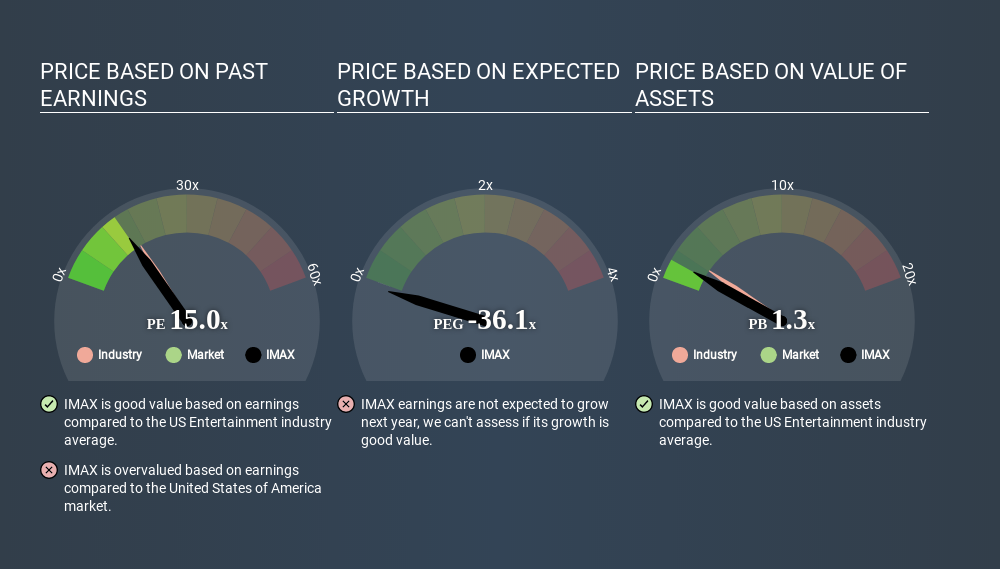- United States
- /
- Entertainment
- /
- NYSE:IMAX
A Rising Share Price Has Us Looking Closely At IMAX Corporation's (NYSE:IMAX) P/E Ratio

IMAX (NYSE:IMAX) shareholders are no doubt pleased to see that the share price has bounced 37% in the last month alone, although it is still down 30% over the last quarter. But that will do little to salve the savage burn caused by the 54% share price decline, over the last year.
Assuming no other changes, a sharply higher share price makes a stock less attractive to potential buyers. In the long term, share prices tend to follow earnings per share, but in the short term prices bounce around in response to short term factors (which are not always obvious). So some would prefer to hold off buying when there is a lot of optimism towards a stock. One way to gauge market expectations of a stock is to look at its Price to Earnings Ratio (PE Ratio). Investors have optimistic expectations of companies with higher P/E ratios, compared to companies with lower P/E ratios.
View our latest analysis for IMAX
How Does IMAX's P/E Ratio Compare To Its Peers?
IMAX's P/E of 15.04 indicates relatively low sentiment towards the stock. If you look at the image below, you can see IMAX has a lower P/E than the average (16.5) in the entertainment industry classification.

IMAX's P/E tells us that market participants think it will not fare as well as its peers in the same industry. While current expectations are low, the stock could be undervalued if the situation is better than the market assumes. It is arguably worth checking if insiders are buying shares, because that might imply they believe the stock is undervalued.
How Growth Rates Impact P/E Ratios
Probably the most important factor in determining what P/E a company trades on is the earnings growth. When earnings grow, the 'E' increases, over time. Therefore, even if you pay a high multiple of earnings now, that multiple will become lower in the future. And as that P/E ratio drops, the company will look cheap, unless its share price increases.
In the last year, IMAX grew EPS like Taylor Swift grew her fan base back in 2010; the 111% gain was both fast and well deserved. Even better, EPS is up 22% per year over three years. So you might say it really deserves to have an above-average P/E ratio.
Don't Forget: The P/E Does Not Account For Debt or Bank Deposits
It's important to note that the P/E ratio considers the market capitalization, not the enterprise value. That means it doesn't take debt or cash into account. The exact same company would hypothetically deserve a higher P/E ratio if it had a strong balance sheet, than if it had a weak one with lots of debt, because a cashed up company can spend on growth.
Such expenditure might be good or bad, in the long term, but the point here is that the balance sheet is not reflected by this ratio.
How Does IMAX's Debt Impact Its P/E Ratio?
IMAX has net cash of US$91m. This is fairly high at 14% of its market capitalization. That might mean balance sheet strength is important to the business, but should also help push the P/E a bit higher than it would otherwise be.
The Bottom Line On IMAX's P/E Ratio
IMAX trades on a P/E ratio of 15.0, which is fairly close to the US market average of 14.9. Its net cash position is the cherry on top of its superb EPS growth. So based on this analysis we'd expect IMAX to have a higher P/E ratio. What we know for sure is that investors have become more excited about IMAX recently, since they have pushed its P/E ratio from 11.0 to 15.0 over the last month. If you like to buy stocks that have recently impressed the market, then this one might be a candidate; but if you prefer to invest when there is 'blood in the streets', then you may feel the opportunity has passed.
When the market is wrong about a stock, it gives savvy investors an opportunity. People often underestimate remarkable growth -- so investors can make money when fast growth is not fully appreciated. So this free visual report on analyst forecasts could hold the key to an excellent investment decision.
You might be able to find a better buy than IMAX. If you want a selection of possible winners, check out this free list of interesting companies that trade on a P/E below 20 (but have proven they can grow earnings).
If you spot an error that warrants correction, please contact the editor at editorial-team@simplywallst.com. This article by Simply Wall St is general in nature. It does not constitute a recommendation to buy or sell any stock, and does not take account of your objectives, or your financial situation. Simply Wall St has no position in the stocks mentioned.
We aim to bring you long-term focused research analysis driven by fundamental data. Note that our analysis may not factor in the latest price-sensitive company announcements or qualitative material. Thank you for reading.
About NYSE:IMAX
IMAX
Operates as a technology platform for entertainment and events in the United States, Greater China, rest of Asia, Western Europe, Canada, Latin America, and internationally.
Adequate balance sheet with moderate growth potential.
Similar Companies
Market Insights
Community Narratives





